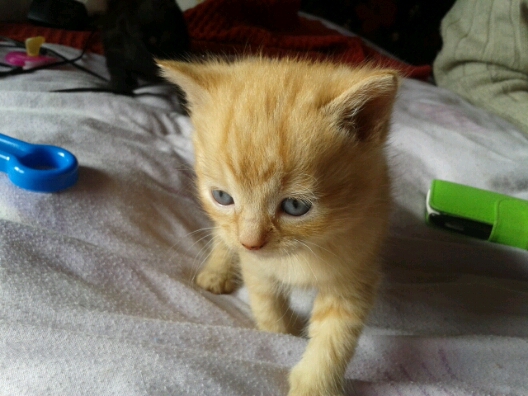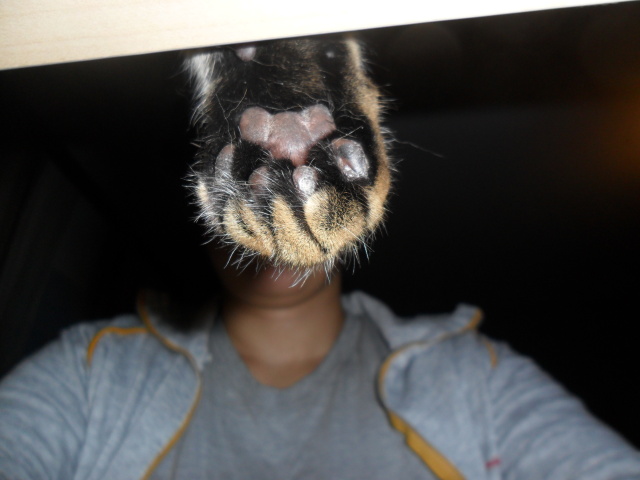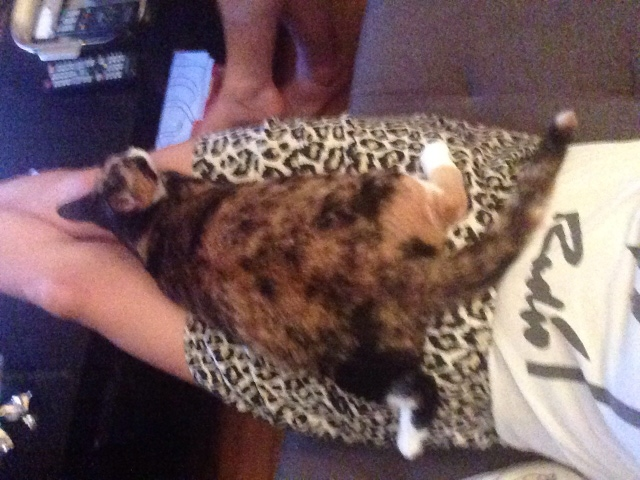QuestionHi, I have a 20-month-old, un-neutered, male, domestic short hair cat. He is not de-clawed and has all his shots up-to-date. He is an indoor cat and has been living with my boyfriend and I since we purchased him from a renowned pet shop in the area when he was 3 months old. My question is about his unprovoked attacks on me alone. Anytime my boyfriend and I play-wrestle and laugh loudly, my cat will viciously attack me. Even if he wasn't originally in the same room as us, the cat will run in and bite down on whatever part of me he can, almost always drawing blood and leaving nasty gashes and sometimes even bruises from the sheer force of his pounce; he never attacks my boyfriend though. I have never harmed my cat or yelled at him in any way, in fact my boyfriend has been the cat's disciplinarian since we got him. If I yell out in pain once he's bit me, he simply prepares to attack again and I'll have to scramble for cover. Any idea why he does this? Why does he only bite me? This is stressing me out since I always have to keep an eye open and have my guard up. Is there anything I can do to modify this behaviour? Neutering is not an option since we don't believe in it. Any assistance would be greatly appreciated.
Sincerely,
Terrified-of-my-kitty (Olivia)
AnswerOlivia,
I've given serious thought to the problems you've been having with your cat because I wanted to try and give you options that are in everyone's best interests. The reality is that I've had some difficulty coming up with solutions that humane, simple and will make everyone happy. In this situation there just aren't any easy answers. I am very concerned about the possibility that the cat's aggression will escalate further which would likely jeopardize his future. It's a shocking and unfortunate fact that the leading cause of death in North America for cats is euthanasia due to behavioral problems.
As a passionate cat lover and dedicated rescuer of abused, abandoned, injured and traumatized stray and feral cats it's my wish that one day soon potential pet parents will completely understand their day to day responsibilities to an adopted animal and have a complete idea of how best to fulfill their feline family member's needs and instincts. I want desperately to see an end to people abandoning their cats or resorting to physical abuse or emotional/physical neglect to end preventable or simple to change behavioral issues commonly seen in house cats. There is an extremely serious pet overpopulation problem which taxes shelters, rescue groups and compassionate individuals who rescue unwanted, abused or neglected cats to their limit. The majority of shelters are forced to euthanize countless unwanted, healthy, adoptable cats and kittens on a daily basis.
Veterinarians often go into the field of veterinary medicine because they love animals, they want to treat/prevent illness and whenever necessary they are given the responsibility of euthanasia which is meant to be used to alleviate pain and suffering in our four legged friends. Every day animal loving veterinarians are forced to make difficult decisions and somehow answer ethical questions related to euthanizing young, healthy cats who aren't in pain or suffering from an incurable disease because a cat's family has come into the clinic requesting a permanent solution to ongoing behavioral issues like house soiling or aggressive behavior towards family members, visitors, children or other pets within the home. The most difficult thing for me as someone who loves cats of all sizes and shapes and a passionate advocate for rescued cats who have nobody else to protect them or act in their best interests is that in the majority of cats behavioral issues can be prevented or stopped before things get out of hand. In many cases when undesirable behaviors are caught early and they aren't allowed to escalate to the point of being out of control they can treated successfully.
In most cases pet parents caring for cats who have developed undesirable behavioral issues have failed to see the smaller behaviors that if corrected appropriately may have prevented the cat's behavior from escalating in the first place. Cats are quite smart and they will sometimes push their human caregivers with behaviors that increase in intensity over time just to see how much they can get away with. The level of aggression that you've described in your answer to me suggests that this is a very serious and potentially dangerous situation. I have the impression that you and your boyfriend are living together in a committed relationship which may eventually lead to the decision to have children later on in life. My worry is that your cat is so out of control that he can't be trusted not to hurt babies or young children and I'm sure that you and your boyfriend would be horrified if your cat caused any injuries to guests, visiting children, other pets in your household or even a baby of your own.
I have to admit that can see potential for this aggressive behavior to escalate to the point that you are forced to consider euthanasia or surrendering your cat to a shelter because you can't handle him any longer. In any animal with a history of aggressive behavior the majority of shelters will immediately euthanize the animal because adopting a potentially aggressive animal out to a family carries far too much risk of injury and liability. A cat that can't be trusted to act in a gentle and predictable manner has a serious problem that simply can't be ignored.
I do have a few recommendations that may help reduce or eliminate the cat's attacks in the short term. Some cats will get the picture right away and hey won't behave aggressively with anyone any longer, however cats can be quite determined to do things their way so some cats can improve for awhile and then go right back to their undesirable behavior. There are different ways of dealing with aggression, however the reality is that most veterinarians, behaviorists, holistic vets and trainers are going to recommend that the cat be neutered immediately because intact cats are more likely to become aggressive, get into fights, have serious behavioral problems that often lead to euthanasia and develop fatal but preventable medical problems during their lifetime.
For the moment you could try using a few simple and relatively inexpensive tools to get your point across to the cat. It's very important that the cat is never swatted, spanked or hit with hands or any other objects when attempting to correct them because this can make a cat more likely to become aggressive. Keeping spray bottles (the kind you find in the dollar store for misting plants) filled with water, a few cans of compressed air (used for cleaning electronics and computer equipment) and a few air horns in all of the rooms in your home will provide you with effective and humane ways to discipline your cat. Spray bottles often work well because cats don't usually enjoy the work of drying their coat after getting wet so this is a commonly used tool that vets and behaviorists routinely recommend to help modify inappropriate behavior in cats. Cans of compressed air must never be sprayed directly at the cat because these cans contain chemicals which can cause frost bite or other damage to the skin. When using compressed air a 2-3 second blast tends to get the point across in a language that the cat understands completely. When sprayed the compressed air creates a hissing sound which often elicits a fairly immediate response from the cat. Air horns sold for use in boats are often available in sporting goods stores that specialize in boating/water sports. The air horns are very loud so if you live in an apartment it's not wise to use them at night because you will most likely wake up the neighbors. Cats have very sensitive hearing and a loud noise will often startle them into submission and stopping the unwanted behavior.
You may find that your cat doesn't completely get the idea when you try to correct him, he may in fact test you to see what he can get away with simply because he's never been corrected by you. If the cat isn't likely to bite you when handled you can place him into his travel cage for a 5-10 minute time out which will allow him to cool off a bit. I suspect that you may have difficulty getting this little guy to go into his kennel peacefully because most people don't take the kennel out unless the cat is going to the vet so I would recommend that you keep the cat's crate in an area that he spends a fair bit of time in so that he can get accustomed to being allowed into and out of the crate of his own free will. In the meantime you can use the broom to gently guide your kitty into another room and shut the door to give him some time to calm down. I have cared for some cats who give themselves time outs when they need them by going to the travel cages and lying down for 5-10 minutes or so, this method of discipline often causes cats to associate a behavior with a consequence which can lead to the cat giving him/herself the consequence before they misbehave.
If anyone plays with this cat using their hands or any other part of the human body this has to stop immediately because if the cat is socialized to believe that it's okay to attack any part of a person's body when he wants to play he will continue to do so regardless of whether or not he was invited to do so. Cats should be taught from an early age that toys are the only thing that they are allowed to play with - human hands are for affection only, stroking, cuddling and scratching are perfectly acceptable. Cats will test the limits and if they find that there are no consequences for bad behavior they will often see how far they can push before they are corrected or disciplined. You did mention that your boyfriend has been the only person to discipline this cat and that the cat never attacks him which suggests to me that the cat is fairly certain that you are lower on the household hierarchy than he is.
I'm quite sure that having to live in a household where you have to be prepared at any time for the cat to attack you is stressful for everyone in your household, including the cat. Behavioral problems like the ones you're having with this cat could potentially cause enough stress between you and your partner that there may be future difficulties within the relationship between you and your partner. Cats are highly intuitive, they read body language and moods with ease and they can often sense how someone feels about them so the stress is causing problems for your little guy as well. I am under the impression that you and your boyfriend are in a serious, committed relationship which may someday lead to a lifetime commitment and the possibility of having children and becoming parents together.
Given the serious aggressive behavior that this cat is routinely showing towards you I have some concerns about how much worse the attacks are going to escalate. At this time I have serious reservations about this cat being allowed to be around children because there's a very real possibility that your cat might attack someone from outside of his immediate family. It's very important to actually consider that the cat may hurt someone visiting your home or even your own child, if this does happen your cat's future will be very uncertain as different jurisdictions have different ways of dealing with an animal who has a history of aggressive behavior. I do believe that it's important to understand that this cat can possibly live upwards of 20+ years depending on his general health, environment, diet and medical care. I think that it's important to think about the following question: Do you really want to risk that this cat's behavior will continue to escalate to the point where he seriously hurts you, any child or a guest in your home?
I am extremely concerned about this cat's future because he is exhibiting very serious aggression which could be difficult to treat. The problems you are having are quite likely related to the fact that your cat hasn't been neutered. I understand that you and your boyfriend aren't comfortable with the idea of having your cat neutered but I do think that sterilization would substantially reduce or completely eliminate this kitty's aggression. The types of anesthesia used today are very safe so any risk to the cat is minimal. One of the most obvious benefits to sterilizing a cat is population control. Simply put spaying and neutering our pets saves lives, it's an ethical and responsible choice that has health and behavioral benefits.
There might be a number of reasons for why the cat only attacks you. Since this kitty hasn't been neutered it's possible that he's jealous, he may view your boyfriend as a possession that he doesn't want to share with you. It's not unheard of for a dominant cat to view one or more of their human caregivers as being lower than they are in the household hierarchy which can result in attacks meant to keep everyone submissive. There's even a possibility that the attacks are a sign of frustration due to the fact that your cat can't do what his instincts are telling him he should be doing. Intact male cats live their lives, eating, sleeping, marking their territory with urine or feces, mating with receptive female cats and fighting to protect their territory and maintain control over as many female cats as possible so that he can pass along his genes to another generation.
As I'm sure you are aware there are countless healthy, adoptable, unwanted cats are euthanized daily in shelters worldwide because there is a very serious pet overpopulation problem. Nothing would please me more than to finally see shelters never having to euthanize animals waiting to find their forever families simply because the shelter has run out of space and time for that particular animal. As much as I'd like to see the sad realities about unwanted pets living in shelters change it doesn't seem likely to happen anytime soon. Most humane organizations devote a significant amount of time and energy towards humane education including the importance of sterilizing pets early to try and prevent unwanted litters, reduce the likelihood of serious medical and behavior problems.
I would like to understand why you and your partner aren't comfortable with the cat being neutered. I may be able to help you more effectively if I knew what your concerns were when it comes to sterilizing the cat, the surgery will help to make this little guy a better pet and live a longer, healthier life. The anesthetics used today are very safe which means that there is a small risk of serious anesthetic complications. There are many good behavioral and medical reasons to sterilize a cat including a significant reduction in aggression and territorial behavior. Male cats that aren't sterilized are at a high risk of developing testicular or prostate cancer at some point in their lifetime. Sterilized cats are less likely to use urine/feces to mark their territory and most male cats identify their territory by spraying pungent smelling urine throughout it. Some cats will also use feces to mark territory. Male cats that haven't been sterilized are usually quite territorial and somewhat aggressive with other cats, and as you've seen this behavior can sometimes extend to attacks on human caregivers.
In all likelihood if you seek the advice of your family veterinarian s/he will recommend that you have the cat neutered to ensure that he stays in a permanent home and that nobody gets hurt. Your family vet can refer you to a behaviorist, but I can't promise you that a behavioral program would be successful since there's a big possibility that your cat's aggressive outbursts are a result of the testosterone flowing through his veins. It wouldn't hurt to seek the help of a holistic veterinarian, this means that the vet is trained in conventional medicine as well as one or more alternative therapies which can include homeopathy, acupuncture or even massage to name a few. It's possible that an experienced homeopathic vet would be able to offer one or more remedies to decrease the cat's aggression. I'm fairly certain that any responsible veterinarian or behaviorist will recommend that you have the cat neutered, within a few weeks after surgery the cat's testosterone (male sex hormone that can cause aggression, territorial behavior, the urge to fight, wander and mate in cats) levels would drop down after several weeks and the aggression would likely fade away during that time.
I know that the prospect of having your cat have any form of anesthesia along with a surgery is a bit scary. I'd be more than happy to discuss any concerns you might have and help to dispel any myths that you may have heard about spaying and neutering along the way. I have spayed/neutered countless cats and kittens over the years and I've never lost one to anesthetic or surgical complications. If you want to be completely certain that your cat is healthy enough to be put under anesthesia and have the surgery you could have your vet perform a pre-anesthetic blood profile which will give an accurate picture of how the cat's major organ systems are functioning. You could also ask your vet to do some more expensive testing to ensure that your little guy's heart doesn't have any previously undetected congenital abnormalities, but most pet parents don't go quite that far because these tests can be quite expensive.
Neutering is actually a much quicker and far less invasive surgery than spaying. The cat is under anesthesia for a very short time, the incisions are tiny enough that they can be difficult to see and the whole process of removing the testicles is generally fairly simple unless of course your cat's testicles haven't descended. A male cat whose testicles haven't descended is usually under anesthesia for longer than average because the vet must find them to remove them. In most vet clinics all cats undergoing spay/neuter surgery are given pain relievers before they wake up from their surgery and they are bright, alert and happy to come home the same day. Some vets prefer to keep female cats in the hospital overnight so that they can be monitored for any discomfort or complications, however with male cats they're usually sent home the same day.
The vast majority of cats that I've had spayed/neutered have come home from the vet's office on the same day with instructions to keep them calm - this is usually a great joke and I get a good laugh out of it because the cats feel so good that they're wanting to bounce off of the walls to burn off pent up energy so keeping them quiet is often nearly impossible. All surgery carries risks regardless of the species involved, however barring any congenital abnormalities that haven't been diagnosed the vast majority of cats and kittens come through surgery just fine. Most cats really don't realize that they've had surgery, in my experience this includes the female cats provided of course that the vet has made sure to bury the last layer of stitches that close the skin or tissue glue because it's not uncommon for female cats to pick at their stitches in an attempt to pull them out. If you decide to neuter your cat you should start seeing significant improvement in his level of aggression and the frequency of attacks over the space of several weeks. Neutering the cat at this stage isn't an instant fix because it will take several weeks for the testosterone levels in his blood to drop down.

 Two Kittens from different litters?
Question
Ginger Female
We wanted to get 2 kitten
Two Kittens from different litters?
Question
Ginger Female
We wanted to get 2 kitten
 Cat paw pad white spot
Question
Drakey Paw Pad
Hi,
I just randomly noticed th
Cat paw pad white spot
Question
Drakey Paw Pad
Hi,
I just randomly noticed th
 What breed is my cat?
QuestionBoots
QUESTION: Hi Norman, i was hoping
What breed is my cat?
QuestionBoots
QUESTION: Hi Norman, i was hoping
 Cat eating too much?
Question
Chickpea
Hello,
Ive attached a photo of
Cat eating too much?
Question
Chickpea
Hello,
Ive attached a photo of
 Cat Breed Identification?
Question
Playtime Pretty Girl
Hi there. &n
Cat Breed Identification?
Question
Playtime Pretty Girl
Hi there. &n